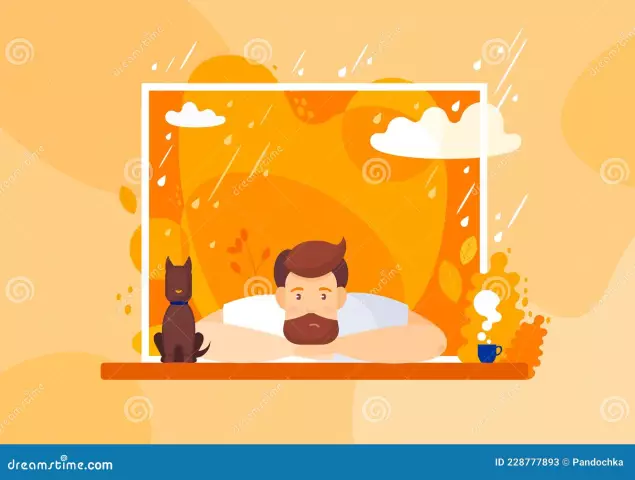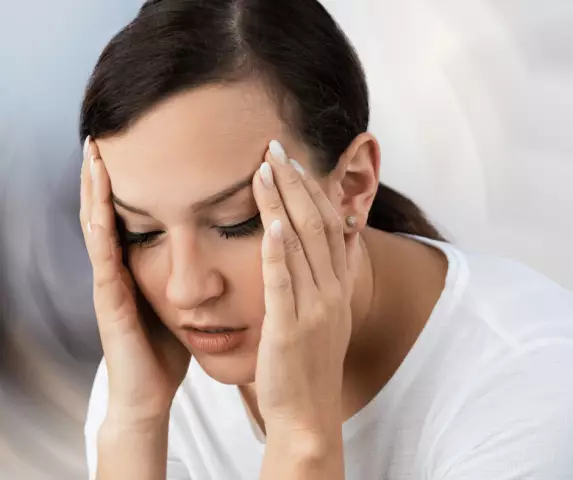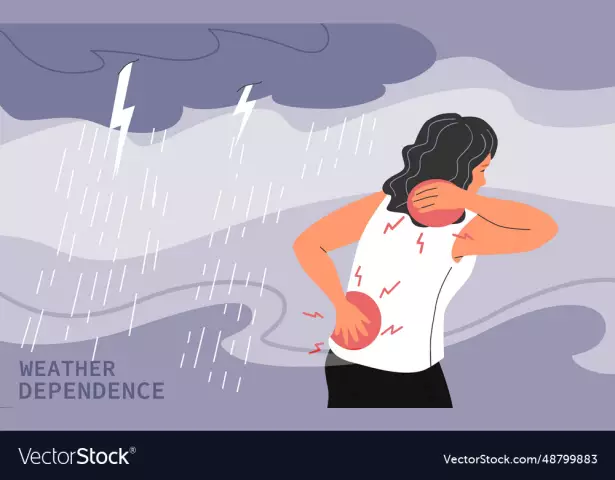- Author Rachel Wainwright wainwright@abchealthonline.com.
- Public 2023-12-15 07:39.
- Last modified 2025-11-02 20:14.
Meteorological dependence: reasons

Sudden changes in temperature and frequent changes in the weather in a short period of time often have negative consequences for health. It has already been noticed that with frequent changes in the weather, people call an ambulance much more often, which means they feel worse.
Despite the fact that there is no such diagnosis as "meteorological dependence", doctors do not deny that the weather really affects our well-being. It is generally accepted that the weaker a person's immunity and more chronic diseases, the more sensitive a person reacts to weather changes. Why?
Where does the weather dependence come from?
According to statistics, meteorological dependence is a hereditary trait in about 10% of cases. Most often it is inherited through the maternal line. 40% of cases of meteorological dependence arise from serious vascular diseases. And the remaining 50% is age and sores that have accumulated throughout life (from birth trauma to stomach ulcers or obesity).
The most common diseases leading to meteorological dependence are atherosclerosis, hypertension and hypotension, chronic respiratory diseases (tonsillitis, tonsillitis, pneumonia), as well as autoimmune diseases (for example, diabetes mellitus).
If meteorological dependence is observed in a child, then most likely, it is a consequence of a severe pregnancy of the mother, difficult childbirth, postmaturity, or, conversely, prematurity.
As practice shows, most of the diseases acquired by a person throughout life remain with him forever. Therefore, people with meteorological dependence can only follow the weather reports and take appropriate measures to relieve symptoms.
Cold snap is bad for health
Doctors believe that a sharp drop in air temperature by 12 degrees or more over a short period of time (12 hours) has a negative effect on a person's well-being. The temperature range is also important. If, for example, the temperature has decreased from +32 degrees to +20, then this is not scary and is not fraught with any negative consequences. But if the spread of fluctuations is in the region of 0 degrees or in a sharp minus (for example, from -18 to -24 degrees), then this is fraught with serious health consequences.
Who will be most affected by extreme temperature changes? These will be patients who have been diagnosed with vascular diseases of the heart and brain, as well as patients who have recently suffered a stroke or heart attack. Doctors strongly recommend that these people avoid physical and mental stress in such weather, adhere to a salt-free diet and be sure to visit a doctor so that he can prescribe appropriate medications for them in this case.
High atmospheric pressure
Elevated atmospheric pressure is above 755 mm Hg. What kind of people feel bad about high barometric pressure? First of all, these are asthmatics and people with mental illness, prone to displaying aggression. Asthmatics with high blood pressure feel a lack of oxygen, but people with mental disabilities feel increased anxiety and causeless sadness.
At elevated atmospheric pressure, the cores also feel bad, especially those who have angina attacks.
Hypertensive and hypotensive patients do not particularly suffer from high atmospheric pressure, but only on condition that the increase came gradually, and not abruptly.
During this period, you need to try not to burden yourself with physical exercise. You can thin the blood and dilate the blood vessels with the help of medicines, black hot tea. And if there are no contraindications, then you can pamper yourself with a glass of cognac or a glass of red wine.
Low atmospheric pressure
Low atmospheric pressure is when the mercury column falls below 748 mm. First of all, they will feel a decrease in hypotensive pressure. They will feel sleepy, dizzy, and tired. Hypertensive patients will also suffer (joint aches, headache and tinnitus).
Low atmospheric pressure will also be felt by people with heart rhythm disturbances - arrhythmia, bradycardia, tachycardia.
But the most serious problem of low atmospheric pressure is a sharp deterioration in mental balance in people prone to depression and suicide.
Nevertheless, according to doctors, it is easier to neutralize the symptoms of low blood pressure than high blood pressure. The first thing to do is to provide yourself with fresh air (for example, open a window). It is very important to sleep well not only at night but also during the day. You need to eat something moderately salty, for example, a salted tomato or herring.
Snowfall
70% of people in snowy weather do not feel any changes in their condition. Many people even like this weather, and they feel a surge of positive emotions.
However, people suffering from vegetative vascular dystonia feel bad. The cerebral vessels in this disease do not work correctly, therefore, in such weather, a person may feel dizzy, nauseous and a feeling of stunnedness. Security measures must be taken. First of all, these are vascular preparations prescribed by the attending physician, as well as preparations that increase the tone - eleutherococcus extract, succinic acid or strong tincture of ginseng.
Windy weather
It is strange, but adult men practically do not react to windy weather, but women, especially prone to migraine attacks, do not feel very well. Also, little children under three years old react badly to the wind.
But asthmatics in windy weather feel great, it becomes easier for them to breathe.
If you do not feel very well in windy weather, use a proven folk recipe: mix equal amounts of nut butter, lemon, flower honey. Take this mixture several times on windy days.
Quiet weather

Do you think that all people should feel good in calm, calm weather? But no. In this weather, some women, especially those over 45, and teenagers begin to feel anxious. It is caused with hormonal fluctuations. People with schizophrenia also feel unwell. Doctors have not fully figured out what this is connected with. The most common opinion is that in the absence of air layers at a height of one to one and a half meters above the ground, the maximum concentration of pollution is achieved. If this is true, then near a fan or air conditioner, the condition should improve.
Storm
Thunderstorms can also be negative in terms of well-being. This is due to the strong electromagnetic field that occurs before a thunderstorm. People with an unstable psyche are very sensitive to it. Menopause women can also feel bad during thunderstorms. The worst thing is that there is no way to alleviate the bad feeling. Well, perhaps, hide deep underground. So, as an option, you can go down to the underpass.
Heatwave
Intense heat affects many people negatively. It becomes the cause of mental depression, blood supply to many organs deteriorates, blood pressure drops. Moreover, the more humidity and the stronger the wind, the more these symptoms worsen.
How can you help yourself? Drink plenty of water mixed with lemon, apple or pomegranate juice and take a cool shower to activate the nerve receptors in your skin. And, of course, take care of yourself.
Found a mistake in the text? Select it and press Ctrl + Enter.






